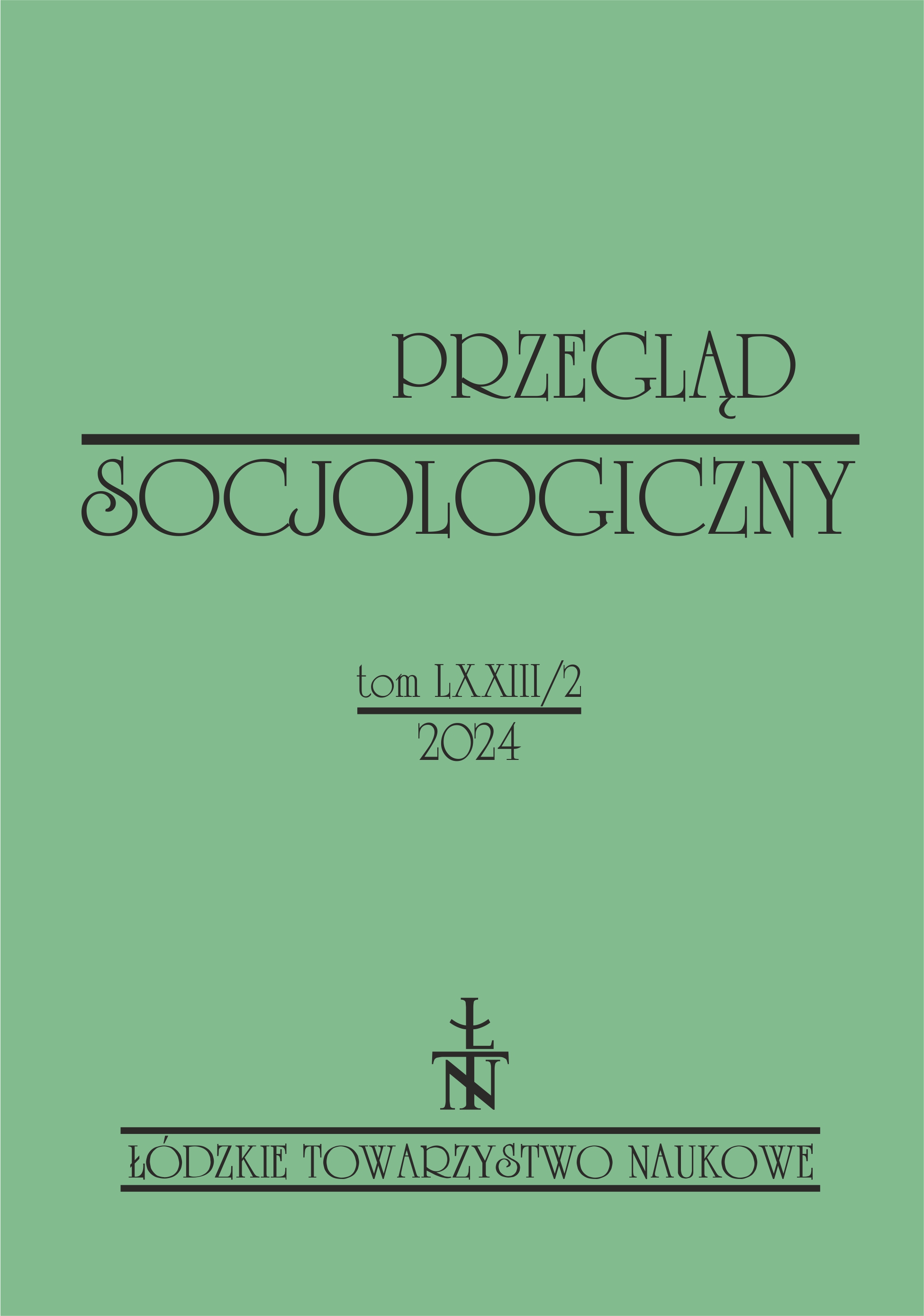Aunting in the network of family relations and practices. An analysis of the scientific literature
DOI:
https://doi.org/10.26485/PS/2024/73.2/7Keywords:
aunting, family practices, kin work, nephews, nieces, fictive kin, extended kinAbstract
Relationships between women and children are too often reduced to mother-child relationships. Despite the recognition of the multidimensionality of the concept of family, sociology is still dominated by the focus on relationships between parents and children, and intimate couples. Meanwhile, motherhood is not the only experience and pattern of close relationships between women and children. One of these other experiences is aunting. Based on an analysis of the literature on aunting, I point out ways of defining who an aunt is and who can become one, as well as what expectations are imposed on her. I discuss family practices and the forms of aunts’ presence in relationships with nieces and nephews: including relational work, care work, supporting them in crisis situations, modelling behaviour and aunts’ rejection of maternal norms of care and sacrifice I also analyse the meanings for aunts and nieces and nephews of the existence of relationships with each other. Aunting offers insights into non-maternal relationships between women and children, in which both parties can retain their agency.
References
Barnwell Ashley. 2019. “Family secrets and the slow violence of social stigma”. Sociology 53(6): 1111–1126. https://doi.org/10.1177/0038038519846443.
Barnwell Ashley. 2022. “Aunting as family shadow-work”. Journal of Family History 47(3): 317–331. https://doi.org/10.1177/03631990221079784.
Burman Erica. 2008. “Beyond ‘women vs. children’ or ‘women and children’: Engendering childhood and reformulating motherhood”. International Journal of Children’s Rights 16: 177–194. https://doi.org/10.1163/157181808X301773.
Conley Dalton. 2005. The pecking order: A bold new look at how family and society determine who we become. New York: Pantheon Books.
Davis-Sowers Regina. 2012. “«It just kind of like falls in your hands»: Factors that influence black aunts’ decisions to parent their nieces and nephews”. Journal of Black Studies 43(3): 231–250. https://doi.org/10.1177/0021934711415243.
di Leonardo Micaela. 1987. “The female world of cards and holidays: Women, families, and the work of kinship”. Signs: Journal of Women in Culture and Society 12(3): 440–453.
Doyle Celia. 2001. “Surviving and coping with emotional abuse in childhood”. Clinical Child Psychology and Psychiatry 6(3): 387–402. https://doi.org/10.1177/135910450100600300.
Ellingson Laura L., Patricia J. Sotirin. 2006. “Exploring young adults’ perspectives on communication with aunts”. Journal of Social and Personal Relationships 23(3): 483–501. https://doi.org/10.1177/0265407506064217.
Ellingson Laura L., Patricia J. Sotirin. 2010. Aunting: Cultural practices that sustain family and community life. Waco: Baylor University Press.
Ensor Sarah. 2012. “Spinster ecology: Rachel Carson, Sarah Orne Jewett, and nonreproductive futurity”. American Literature 84(2): 409–435. https://doi.org/10.1215/00029831-1587395.
Essock-Vitale Susan, Michael T. McGuire. 1985. “Women’s lives viewed from an evolutionary perspective. II patterns of helping”. Ethology and Sociobiology 6(3): 155–173. https://doi.org/10.1016/0162-3095(85)90028-7.
Finch Janet. 2007. “Displaying families”. Sociology 41(1): 65–81. https://doi.org/10.1177/0038038507072284.
Granovetter Mark S. 1973. “The strength of weak ties”. American Journal of Sociology 78(6): 1360–1380.
Hayden Sara. 2011. “Constituting savvy aunties: From childless women to child-focused consumers”. Women’s Studies in Communication 34(1): 1–19. https://doi.org/10.1080/07491409.2011.566531.
Hill Alexandra M. 2014. “Childless woman as failure; or, the «Spinster Aunt» as provocation for the future”. Women in German Yearbook 30: 164–174. https://doi.org/10.5250/womgeryearbook.30.2014.0164.
Lahad Kinneret, Vanessa May. 2021. “Holding back and hidden family displays: Reflections on aunthood as a morally charged category”. Current Sociology 69(7): 1002–1017. https://doi.org/10.1177/0011392121992829.
Langer Nieli, Marie Ribarich. 2007. “Aunts, uncles–nieces, nephews: Kinship relations over the lifespan”. Educational Gerontology 33(1): 75–83. https://doi.org/10.1080/03601270600894279.
May Vanessa, Kinneret Lahad. 2019. “The involved observer: A simmelian analysis of the boundary work of aunthood”. Sociology 53(1): 3–18. https://doi.org/10.1177/0038038517746051.
Milardo Robert M. 2015. Forgotten kin: Aunts and uncles. Cambridge University Press.
Pashos Alexander, Donald H. McBurney. 2008. “Kin relationships and the caregiving biases of grandparents, aunts, and uncles”. Human Nature 19(3): 311–330. https://doi.org//10.1007/s12110-008-9046-0.
Sedgwick Kosofsky Eve. 1993. Tendencies. Durham: Duke University Press.
Sikorska Małgorzata. 2019. Praktyki rodzinne i rodzicielskie we współczesnej Polsce – Rekonstrukcja codzienności. Warszawa: Wydawnictwo Naukowe Scholar.
Sotirin Patty, Laura L. Ellingson. 2007. Rearticulating the aunt: Feminist alternatives of family, care, and kinship in popular performances of aunting. Cultural Studies ↔ Critical Methodologies 7(4): 442–459. https://doi.org/10.1177/1532708607304538.
Sotirin Patricia J., Laura L. Ellingson. 2013. Where the aunts are. Waco: Baylor University Press.
Stone Amy L., Chiara Pride, Benjamin Adams, Roberto Salcido. 2022. “Bisexual aunts, gaycousins: How LGBT Q family members help LGBT Q youth navigate family heteronormativity”. Socius 8. https://doi.org/10.1177/23780231221117145.
Tanskanen Antti O. 2015. “Childlessness and investment in nieces, nephews, aunts and uncles in Finland”. Journal of Biosocial Science 47: 402–406. https://doi.org/10.1017/s0021932014000339.
Thorne Barrie. 1987. “Re-Visioning woman and social change. Where are the children?”. Gender & Society (1)1: 85–109. https://doi.org/10.1177/089124387001001005.
Wedel Joanna R. 2007. Prywatna Polska. Warszawa: Trio.
Downloads
Published
How to Cite
Issue
Section
License
Copyright (c) 2024 Łódzkie Towarzystwo Naukowe

This work is licensed under a Creative Commons Attribution 4.0 International License.



